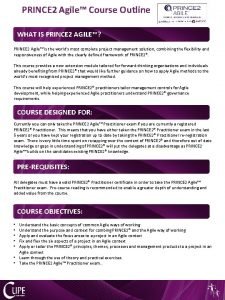Machiavellis The Prince Chapter I The Kinds of






![Chapter VI: Concerning New Principalities Acquired by One’s Own Arms and Ability �[P]eople are Chapter VI: Concerning New Principalities Acquired by One’s Own Arms and Ability �[P]eople are](https://slidetodoc.com/presentation_image_h2/5becef7b9bd75d1f1e44e89e9c3c38d8/image-7.jpg)





















- Slides: 28

Machiavelli’s The Prince

Chapter I: The Kinds of Principalities and the Means by Which They Are Acquired �All states are either republics or principalities. �New states are either completely new or updates of existing ones.

Chapter II: Hereditary Principalities �Will not discuss republics. �Easier to rule hereditary states. �Easier to re-conquer, if one loses power.

Chapter III: Mixed Principalities �Men must be either pampered or annihilated. �Hard to control because you can never live up to expectations. �Previous regimes always keep some control. �Easier to control a principality if the people have the same language and customs as you. �Establish colonies, instead of taking them over completely.

Chapter IV: Why Alexander’s Successors Were Able to Keep Possession of Darius’ Kingdom after Alexander’s Death �Easier to rule a state run by ministers than by nobles. �To control a state run by nobles, you must kill many more people. �Uses historical examples of how this is true.

Chapter V: How to Govern Cities and Principalities That, Prior to Being Occupied, Lived Under Their Own Laws �First – complete destruction �Second – conquer and occupy �Third – let them rule themselves and tax them.
![Chapter VI Concerning New Principalities Acquired by Ones Own Arms and Ability People are Chapter VI: Concerning New Principalities Acquired by One’s Own Arms and Ability �[P]eople are](https://slidetodoc.com/presentation_image_h2/5becef7b9bd75d1f1e44e89e9c3c38d8/image-7.jpg)
Chapter VI: Concerning New Principalities Acquired by One’s Own Arms and Ability �[P]eople are by nature changeable. It is easy to persuade them about some particular matter, but it is hard to hold them to that persuasion. �Imitate great rulers of the past. �Use prowess instead of fortune. �Use force, harder, but if successful, very successful.

Chapter VII: Concerning New Principalities Acquired with the Arms and Fortunes of Others �People become Prince by fortune. �They are weak. �Soldiers are not loyal; so you must eliminate rivals. �You must also lay a foundation.

Chapter VIII: Concerning Those Who Become Princes by Evil Means �“treacherous, pitiless, and irreligious” �Princes who rise through crime achieve power, but never glory. �Must strike all evil at once and then try to become good. �Too much evil leads to revolt.

Chapter IX: Concerning the Civil Principality �Princes who come to power this way are elected by the people. �Two types of people, nobles and common people. �Power by nobles harder to maintain, either dependent on them or indifferent. �Power by the commoners is easy, but less effective.

Chapter X: How the Strength of All Principalities Should Be Measured �An army should always be as big as any competitor. �There must be defenses and fortifications. �Must create patriotism. �Deters aggressors.

Chapter XI: Concerning Ecclesiastical Principalities �Countries controlled by the Catholic Church. �Since they are controlled by religion, these places are easy to control since the people follow blindly. �You do not even need a crown.

Chapter XII: Concerning Various Kinds of Troops, and Especially Mercenaries �Three types of armies. �Prince’s troops �Mercenaries �Auxiliary Troops. �The last two are useless or dangerous or both. �Mercenaries are faithless. Commanders are either unskilled or skilled. Unskilled are worthless, skilled ones can’t be trusted.

Chapter XIII: Concerning Auxiliary, Mixed, and Native Forces �Auxiliary Forces are armies that belong to another Ruler. �They are more skilled and loyal the mercenaries, but they are loyal to another ruler, not You! �This makes them more dangerous, if they lose you are defenseless, if they win, you owe your victory to someone else. �A Prince should command his own forces, if not the principality can never be secure.

Chapter XIV: A Prince’s Concern in Military Matters �A prince must have no other objective, no other thought, nor take up any profession but that of war. �The only thing a prince needs to study is the art of war. �The story of the armed man and the unarmed man. �Rulers must study geography, history, and both he physical and mental side of war.

Chapter XV: Concerning Things for Which Men, and Princes Especially, Are Praised or Censured �Subject has been previously addresses, but theoretically and not practically. �Most people write about ideal men, but men never live their lives virtuously all the time. �Courage, compassion, faith, craftiness, and generosity number among the qualities that receive praise. �Cowardice, cruelty, stubbornness, and miserliness are usually met with condemnation. �However, sometimes the bad can lead to good, preserving the state is the number one responsibility.

Chapter XVI: Liberality and Parsimony �Of all the things he must guard against, hatred and contempt come first, and liberality leads to both. �Liberality, or generosity, is a quality that many men admire. But if a prince develops a reputation for generosity, he will ruin his state. �Ungenerous Princes will eventually be seen as generous. �Frugal princes will eventually have funds to be generous.

Chapter XVII: Concerning Cruelty: Whether It Is Better to Be Loved Than to Be Feared, or the Reverse �Compassion, like generosity, is usually admired. But a prince must be careful that he does not show compassion unwisely. �Crimes harm the entire community; executions only harm individuals. �Cruelty is good to an extent. �Is it better to be loved than feared. Ideally a Prince should be both, but if he can only be one, be feared.

Chapter XVII: Concerning Cruelty: Whether It Is Better to Be Loved Than to Be Feared, or the Reverse �This is because men, by nature, are “ungrateful, fickle, dissembling, anxious to flee danger, and covetous of gain. ” �When inducing fear, however, a prince must be careful to avoid inducing hatred. �He must make sure that any executions are properly justified. �Above all, a prince should never confiscate the property of his subjects or take their women, since these actions are most likely to breed hatred. �With an army, no such thing as too much cruelty, in fact inhumane cruelty is allowed.

Chapter XVIII: In What Way Princes Should Keep Their Word �Princes who honor their word are respected, but history shows us that Princes should be cunning, crafty and able to trick others. �Two ways to fight, by force or by law. �When using force, he acts like a beast (fox and a lion) �However a Prince must always come off as virtuous even if he is not.

Chapter XIX: The Need to Avoid Contempt and Hatred �A prince must avoid being hated at all costs. �Worry about two things; internal insurrection and external threats. �A conspirator might do something if the people will be happy he has done it. �Delegate unpopular laws to others, that way they are the ones disliked. �Not always possible not to be hated, but try not to be hated by the most powerful.

Chapter XX: Whether Fortresses and Many Other Expedients That Princes Commonly Employ Are Useful or Not �Do not disarm your subjects. This will make them want to have arms against you. �Create opposition that you can easily defeat, that way you look more powerful. �Fortresses can both help and hurt, the issue is not building a fortress, but put trust in a fortress.

Chapter XXI: What a Prince Must Do to Be Esteemed �Great Endeavors and noble examples are the best way to win one over people. �Military wins should always be sought. Never stay neutral because both sides will be angry. �Choose partners that are weaker than you, but can still win. �Princes should let their people make money, do not tax too much. Throw celebrations.

Chapter XXII: Concerning the Prince’s Ministers �Ministers are very important because they are the first impression people get. �Three types of intellect a man can posses. �Ability to understand independently �Ability to appreciate another person’s ability �Ability to do neither �Never have a minister who thinks he is better than you because they become a threat.

Chapter XXIII: How to Avoid Flatterers �Flatterers present danger to any ruler. �Convince that you are not offended by the truth, but do not lose respect. They should only offer the truths when asked. �A prince should always seek advice, but not when it is given and not asked for. �Be skeptical of advice. �A prince must posses intelligence of their own or they will fail.

Chapter XXIV: Why the Princes of Italy Have Lost Their States �A number of Italian princes have lost states through their own military faults. �They fled when they should have fought, expecting their subjects to call them back. �They took too much comfort in prosperous times, never anticipating danger. �A prince’s best defense is his own valor.

Chapter XXV: Concerning the Influence of Fortune in Human Affairs, and the Manner in Which It Is to Be Resisted �Although it is often thought that fortune controls human affairs, fortune controls only half of one’s actions, while free will determines the other half. �Fortune is like a river, some people build better dykes and are able to survive fortune. �Fortune favors energetic youth over cautious age.

Chapter XXVI: An Exhortation to Free Italy from the Hands of the Barbarians �Italy’s current disarray favors the emergence of a new prince who will bring happiness to the Italian people. �Lorenzo de’ Medici is Italy’s best hope. If he has learned from the great men named in The Prince, the salvation of Italy will not be difficult. �To succeed, Lorenzo must create a national army.
 Hình ảnh bộ gõ cơ thể búng tay
Hình ảnh bộ gõ cơ thể búng tay Frameset trong html5
Frameset trong html5 Bổ thể
Bổ thể Tỉ lệ cơ thể trẻ em
Tỉ lệ cơ thể trẻ em Gấu đi như thế nào
Gấu đi như thế nào Thang điểm glasgow
Thang điểm glasgow Hát lên người ơi alleluia
Hát lên người ơi alleluia Kể tên các môn thể thao
Kể tên các môn thể thao Thế nào là hệ số cao nhất
Thế nào là hệ số cao nhất Các châu lục và đại dương trên thế giới
Các châu lục và đại dương trên thế giới Công thức tính độ biến thiên đông lượng
Công thức tính độ biến thiên đông lượng Trời xanh đây là của chúng ta thể thơ
Trời xanh đây là của chúng ta thể thơ Cách giải mật thư tọa độ
Cách giải mật thư tọa độ 101012 bằng
101012 bằng độ dài liên kết
độ dài liên kết Các châu lục và đại dương trên thế giới
Các châu lục và đại dương trên thế giới Thể thơ truyền thống
Thể thơ truyền thống Quá trình desamine hóa có thể tạo ra
Quá trình desamine hóa có thể tạo ra Một số thể thơ truyền thống
Một số thể thơ truyền thống Cái miệng nó xinh thế chỉ nói điều hay thôi
Cái miệng nó xinh thế chỉ nói điều hay thôi Vẽ hình chiếu vuông góc của vật thể sau
Vẽ hình chiếu vuông góc của vật thể sau Nguyên nhân của sự mỏi cơ sinh 8
Nguyên nhân của sự mỏi cơ sinh 8 đặc điểm cơ thể của người tối cổ
đặc điểm cơ thể của người tối cổ V. c c
V. c c Vẽ hình chiếu đứng bằng cạnh của vật thể
Vẽ hình chiếu đứng bằng cạnh của vật thể Vẽ hình chiếu vuông góc của vật thể sau
Vẽ hình chiếu vuông góc của vật thể sau Thẻ vin
Thẻ vin đại từ thay thế
đại từ thay thế điện thế nghỉ
điện thế nghỉ




















































